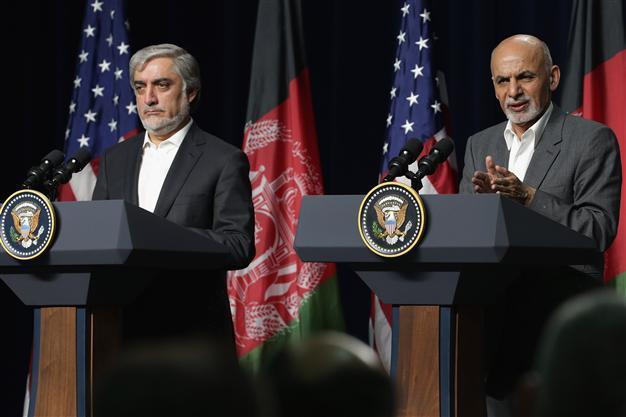US, Afghan leaders to discuss troop withdrawal
WASHINGTON - Agence France-Presse

Afghanistan Chief Executive Abdullah Abdullah (L) and Afghanistan President Ashraf Ghani hold a news conference after a day of talks at Camp David March 23, 2015 in Camp David, Maryland. AFP Photo
President Barack Obama is to meet March 24 with his Afghan counterpart Ashraf Ghani, who has asked Washington for "flexibility" on the pace of US troop withdrawals from the war-torn country.With the end of the US-led NATO combat mission in 2014, Afghan forces have taken over responsibility for security across the nation, still wrestling with a resilient Taliban insurgency.
With the spring fighting season looming, Ghani has asked for some flexibility as the US prepares to pull out the remaining 10,000 American troops by the end of 2016, drawing them down to about 5,500 by the end of this year.
Obama is "actively considering that request," Secretary of State John Kerry told reporters Monday, after a day of talks in the presidential woodland retreat of Camp David in Maryland.
The two countries turned the page on years of distrust Monday, mapping out a new vision for future ties as Washington promised to fund Afghan forces through 2017 to help shore up stability.
Hailing a day of "productive talks," Kerry said the two countries shared "a commitment to security and peace and a desire to promote prosperity and social progress."
Earlier, Ghani warmly thanked US troops for more than a decade of sacrifice since the 2001 toppling of a Taliban government by a US-led invasion.
"We do not now ask what the United States can do for us. We want to say what Afghanistan will do for itself and for the world," said Ghani, turning around a famous phrase of former US leader John F. Kennedy.
"And that means we are going to put our house in order," he told soldiers and senior US officials at a Pentagon ceremony on his first official visit to Washington.
In a stark reminder of the violence still racking Afghanistan, gunmen killed 13 bus passengers in a province close to Kabul early on Tuesday.
On Tuesday, before meeting Obama, Ghani will head to Arlington National Cemetery, where many of the 2,300 US troops killed in Afghanistan are buried.
The issue of troops is set to top the White House talks. Ghani diplomatically refused to be drawn when asked how many soldiers he would like to see remain.
"The question on numbers is a decision for the president of the United States, and that decision will solely be made by President Obama," Ghani said.
It was a new tone compared to that heard from former Afghan president Hamid Karzai, who had a tempestuous relationship with Obama and repeatedly criticized US officials for what he called interference in his country.
In a sign of America's "unwavering commitment" to a strong, strategic partnership, Washington agreed to ask Congress to fund the level of Afghan security forces at an "end strength" of 352,000 through to 2017.
"Pinning" down the number of Afghan security forces would provide "some stability... as they otherwise undergo this very significant transition," said Defense Secretary Ash Carter, while stressing that it remained Obama's intention to pull out most US troops.
Carter also praised Ghani's remarks at the Pentagon which "underscored the extent to which the United States now has a revitalized partnership with Afghanistan's new unity government."
In a separate initiative, the US will commit up to $800 million to a new development partnership to promote sustainable and transparent economic reforms, Kerry said, adding he would return to Kabul some time this year to kick-start resumed bilateral dialogue.
Despite the pledges of US support, Ghani vowed his country would not "be a burden" to the international community, saying his unity government shared a "sense of urgency" of the need for reforms to become self-sustaining.
After years of battling with the mercurial Karzai, Washington has welcomed the arrival of Ghani and chief executive Abdullah Abdullah as a breath of fresh air.
They took office in late 2014, in a power-sharing deal negotiated by Kerry in a 48-hour mission to Kabul which was widely credited with preventing a bitter election from flaring into open conflict.
















